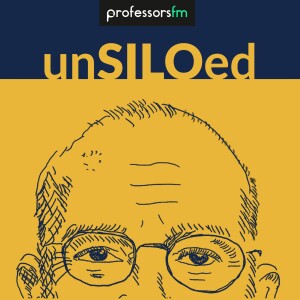
353. Studying the History of Knowledge feat. Peter Burke
 2023-11-06
2023-11-06
How does one tell the story of knowledge through the centuries? And what kind of knowledge is being discussed when looking at its history?
Peter Burke, a professor of history at Cambridge University, has written more than 30 books over the course of his lifetime and has taken a special interest in studying the history of knowledge and polymaths.
He and Greg discuss a couple of his major works like The Polymath: A Cultural History from Leonardo da Vinci to Susan Sontag and What is the History of Knowledge? (What is History?). They also discuss how the history of knowledge can not come without a history of ignorance, whether or not polymaths are a thing of the past, and if the aggregate amount of knowledge is increasing today.
*unSILOed Podcast is produced by University FM.*
Decision-Making, where history of knowledge meets general history
39:59: I got into decision-making, and the nice thing about it is it connects history of knowledge with general history more clearly than other studies in the history of knowledge. So it breaks down one more barrier because one great thing about history in the last couple of generations is the interest of different historians in different other disciplines: economic historians studying economics, social historians studying sociology. The great price has been that in having a fruitful dialogue with their colleagues in the neighboring discipline, they no longer speak to other historical colleagues, but this history of knowledge and ignorance has the potential for connecting things. All these different practical areas where decisions are taken that is influencing the history of the world, and knowledge is playing this crucial part, or the absence of knowledge is playing this crucial part.
What unique insights do historians offer to understand knowledge creation and innovation?
48:30: Historians are people who specialize in telling you that the problem that you think is unique is one that has occurred a number of times in the past. And that's the most specifically historical. Otherwise, I think historians are like sociologists and even more like anthropologists because they try to understand the mindset of people in other cultures, and this is an absolutely indispensable kind of knowledge, which we need more and more in a globalizing world where we're constantly living. Meeting people from other cultures, constantly misunderstanding them, and constantly being misunderstood by them.
How does the brain of polymaths work?
21:17: Polymaths need a great power of concentration. So, they're described by their families and friends as they pick up a book, and they somehow sort of suck the contents out in half an hour, but they do this because they've got this incredible concentration. But because they're concentrating on the problem, and they're living in the everyday world, what other people notice is their failure: The failure of the polymaths to notice what's happening around them, absent-mindedness. But their mind, if it's absent from ordinary everyday life, is extremely present next to the problem they're trying to solve.
New knowledge is always associated with new ignorance
42:33: New knowledge is always associated with new ignorance, and this is inevitable given that human beings still sleep for eight hours a night except for a few polymaths. And they don't spend all their time acquiring knowledge. So if they acquire some of the new knowledge, for example, about IT, and then they've got less time to acquire some of the old knowledge.
- Karl Mannheim
- Edward Shils
- Gottfried Wilhelm Leibniz
- Pierre Bourdieu
- Thomas Aquinas
- Lewis Mumford
- Cs lewis discarded image
- Faculty Profile at Cambridge University
- Ignorance: A Global History
- The Polymath: A Cultural History from Leonardo da Vinci to Susan Sontag
- The Art of Conversation
- What is the History of Knowledge? (What is History?)
- French Historical Revolution
- The Italinan REnaissance
- What is Cultural History?
- Social History of Knowledge
- Fortunes of the Courtier
- Eyewitnessing
- Cultural Hybridity
More Episodes
Create your
podcast in
minutes
- Full-featured podcast site
- Unlimited storage and bandwidth
- Comprehensive podcast stats
- Distribute to Apple Podcasts, Spotify, and more
- Make money with your podcast
It is Free
- Privacy Policy
- Cookie Policy
- Terms of Use
- Consent Preferences
- Copyright © 2015-2024 Podbean.com






